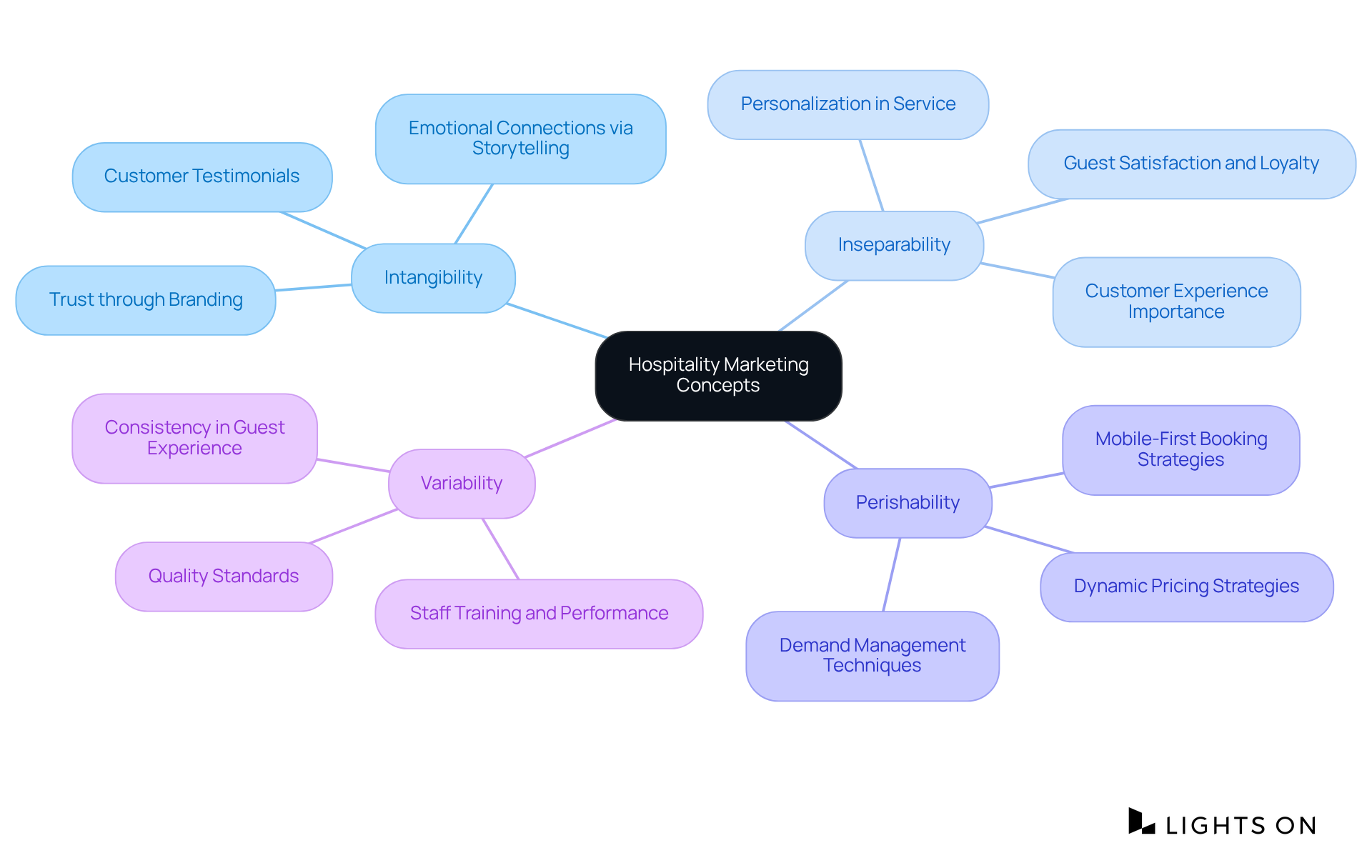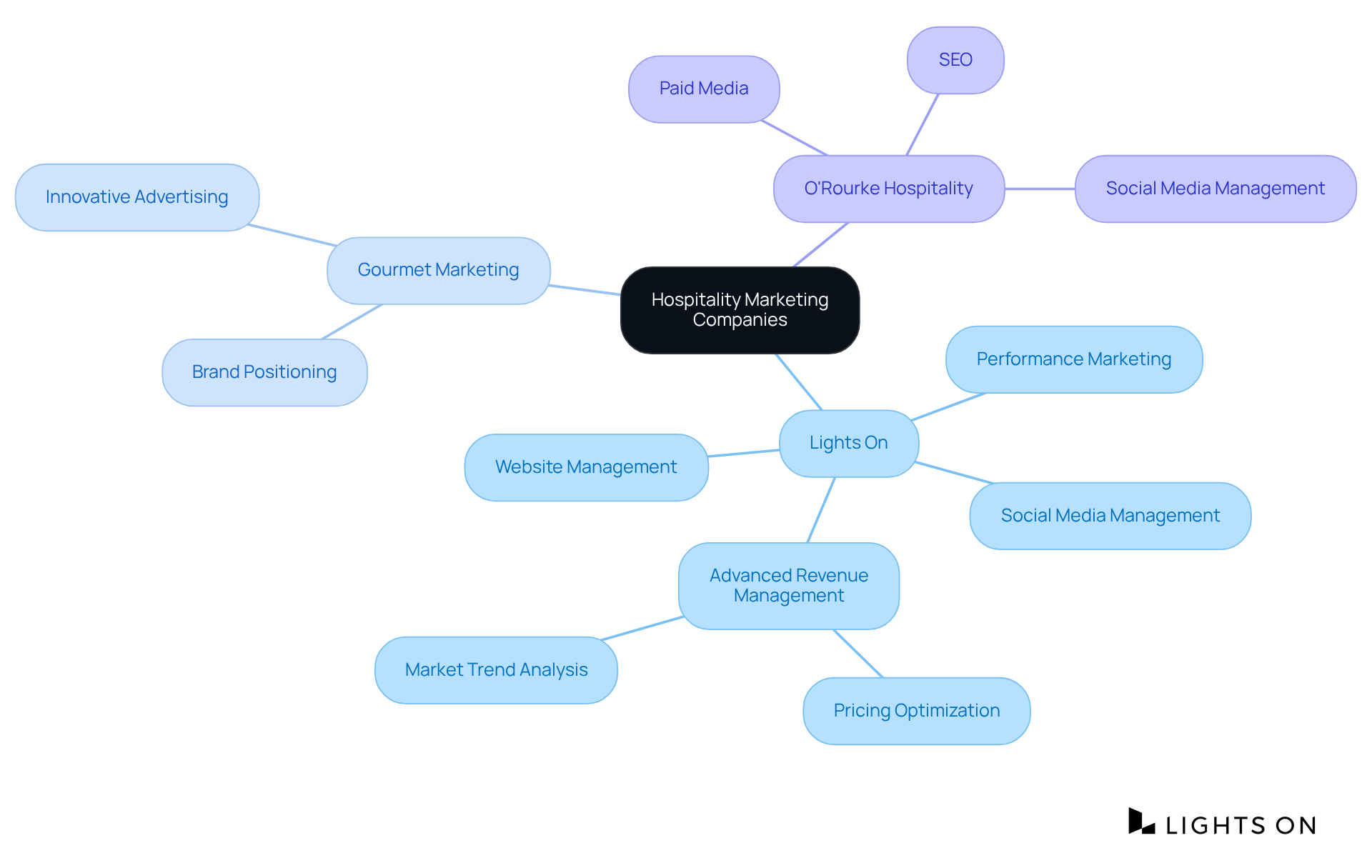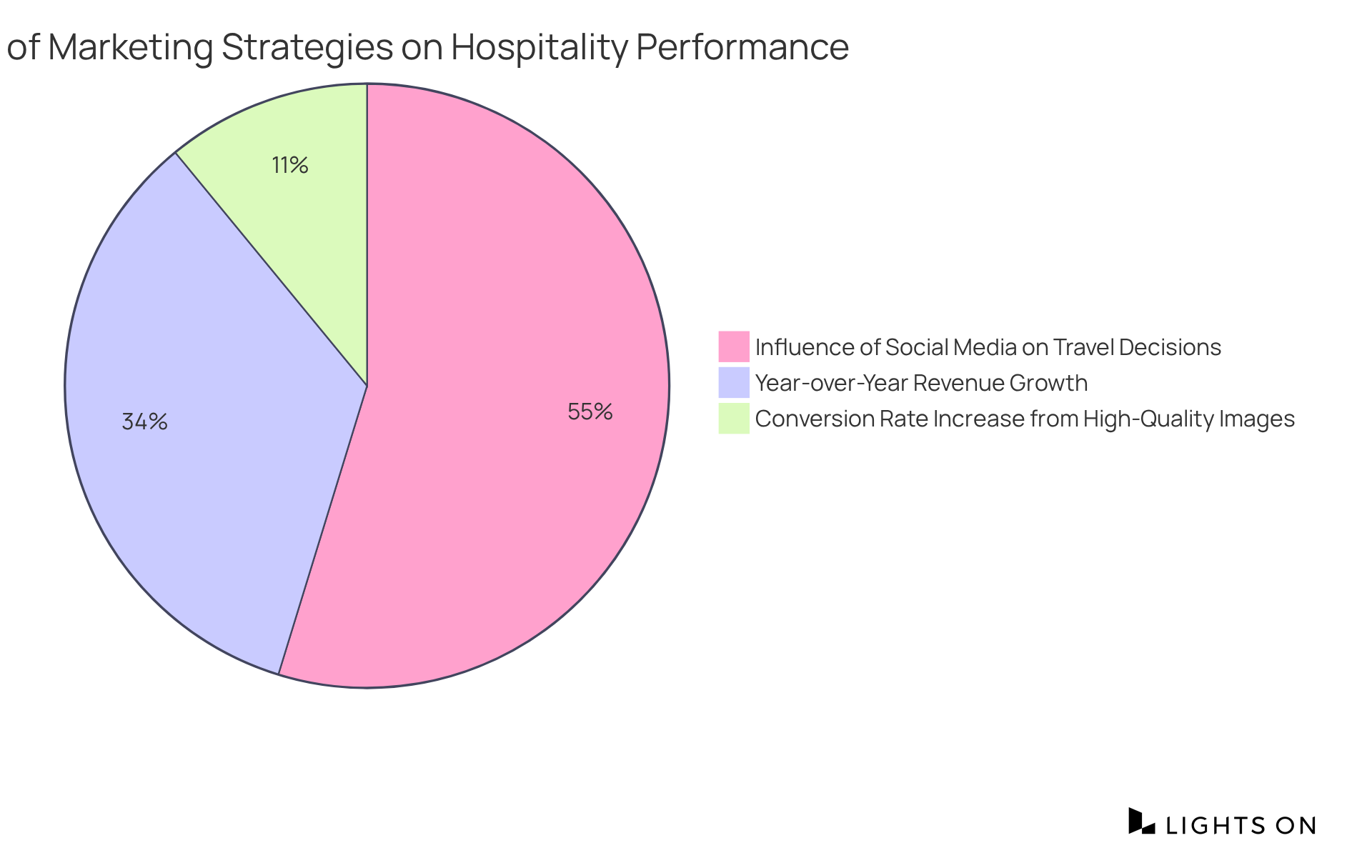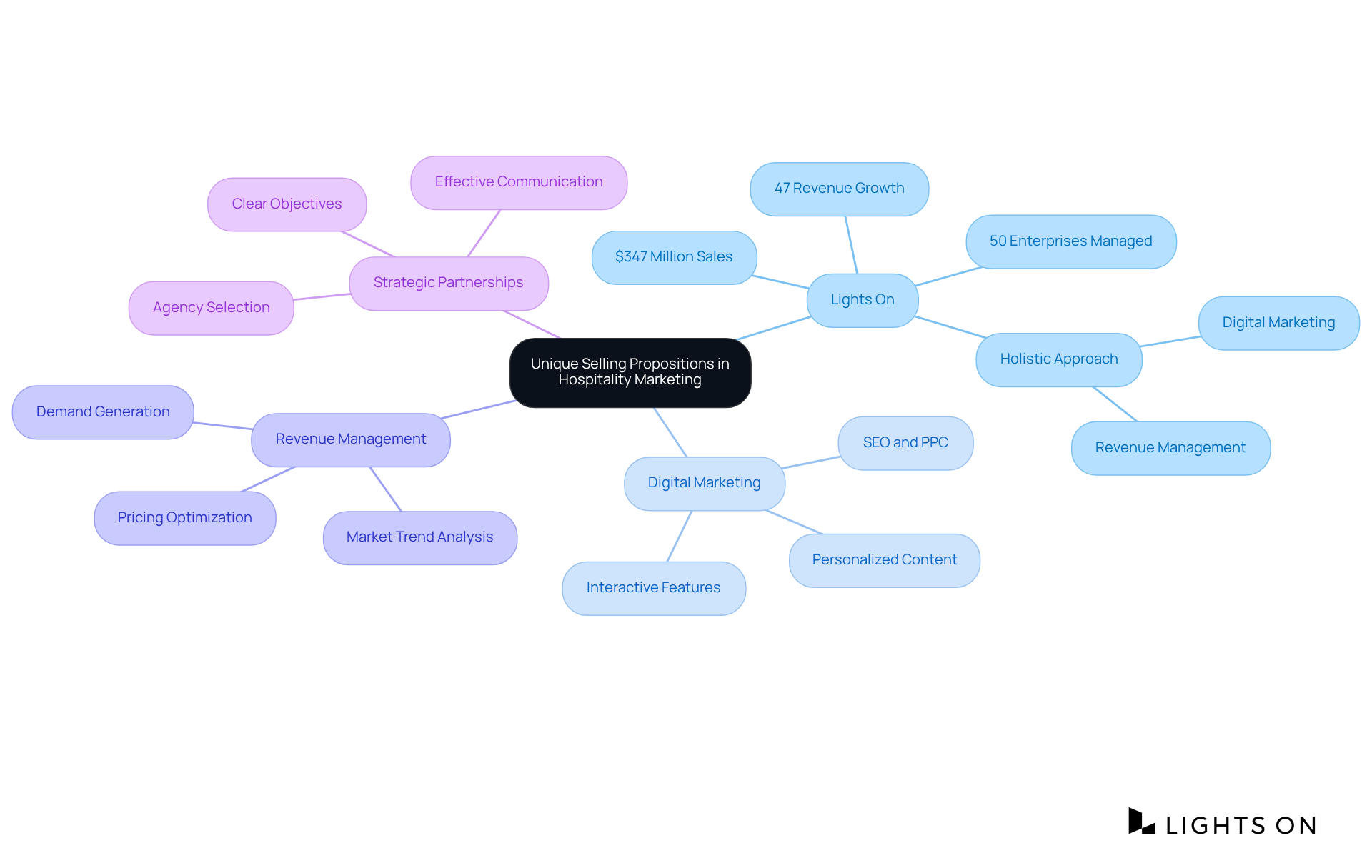This article examines the competitive landscape of hospitality marketing companies by analyzing their services and strategies within the hospitality industry. It underscores the distinctive offerings of firms such as Lights On, Gourmet Marketing, and O'Rourke Hospitality. By emphasizing their unique marketing approaches—ranging from data-driven strategies to tailored solutions—this analysis illustrates how these methods can significantly bolster brand visibility and enhance financial performance for hospitality businesses.
The hospitality industry thrives on a delicate balance of service and experience, where effective marketing plays a pivotal role in attracting and retaining customers. As businesses navigate this competitive landscape, understanding the diverse offerings and strategies of hospitality marketing companies becomes essential for success. With a myriad of options available, how can establishments discern which partner will best elevate their brand and drive revenue? This article delves into a comparative analysis of leading hospitality marketing firms, exploring their unique services and strategies to uncover the key factors that can make or break a business's promotional efforts.
Hospitality marketing companies represent a specialized domain focused on the advertising of hotels, restaurants, and other service-oriented establishments within the hospitality industry. Grasping its key concepts is vital for assessing marketing strategies and their influence on business performance.
Intangibility underscores the unique nature of services, which, unlike physical products, cannot be seen or touched before purchase. This characteristic necessitates the establishment of trust through effective branding and positive customer testimonials. For instance, successful brands leverage storytelling to forge emotional connections, thereby enhancing perceived value and encouraging bookings. Frank DePino asserts that "storytelling for hotels is the best strategy you can use to boost your bookings and give your customers a reason to choose you over your competitors."
Inseparability highlights the concurrent creation and utilization of offerings, emphasizing the importance of customer experience. A positive interaction can significantly impact guest satisfaction and loyalty, making it essential for hospitality businesses to prioritize exceptional service at every touchpoint. Notably, 65% of customers recognize personalization as a critical element in their experience, prompting hotels to adapt their strategies accordingly.
Perishability presents a challenge, as services, particularly in hospitality, cannot be stored for future sale. This reality necessitates effective demand management strategies to and revenue. For example, dynamic pricing models can maximize revenue during peak times while offering discounts during slower periods. The emergence of mobile-first strategies further accentuates the need for agility in managing bookings and customer interactions.
Variability reflects the fluctuating quality of service, influenced by factors such as staff performance and customer expectations. Regular training and adherence to quality standards are crucial for minimizing variability and ensuring a consistent guest experience. As the industry grapples with challenges like labor shortages and compliance with data privacy laws, upholding high service standards becomes increasingly vital.
By comprehending these concepts, hospitality professionals can adeptly navigate the complexities of promotional strategies employed by hospitality marketing companies, ultimately enhancing their brand presence and financial performance. For instance, the Marina Inn at Grande Dunes improved its online presence, resulting in a 35% increase in online reservations, exemplifying the practical application of these promotional principles.

When evaluating , it is essential to consider the diverse offerings they provide. For example, Lights On delivers a comprehensive suite that includes:
Gourmet Marketing emphasizes customized strategies for independent hotels, focusing on:
In contrast, O'Rourke Hospitality specializes in digital solutions, encompassing:
Each company presents its unique advantages, and understanding these distinctions can significantly aid businesses in selecting the right partner from hospitality marketing companies tailored to their specific promotional needs.

Assessing the efficacy of promotional approaches requires a thorough analysis of client results and performance indicators. For instance, Lights On has achieved an impressive average year-over-year revenue growth of 47%, underscoring the success of their data-driven approach in enhancing financial performance for hotels and restaurants. Client testimonials, including those from Markus Schale, General Manager of Hotel Wailea, emphasize how Lights On's strategies have not only surpassed revenue expectations but also enhanced brand visibility following renovations.
In comparison, Gourmet Marketing, one of the top hospitality marketing companies, boasts high client satisfaction rates, with numerous clients reporting significant enhancements in brand visibility and customer engagement. Their focus on customized promotional solutions aligns closely with client objectives, resulting in measurable improvements. Notably, 75% of travelers indicate that social media influenced their selection of destination, highlighting the critical role of social media in promotional strategies.
'O'Rourke Hospitality further underscores the importance of analytics in demonstrating the ROI of promotional investments. By providing clients with transparent metrics and insights, they help companies understand the effectiveness of their promotional approaches. Moreover, hotels featuring high-quality images experience a 15% greater conversion rate, reinforcing the discussion on effective promotional strategies.
These assessments illustrate the essential function of to achieve optimal outcomes, particularly in a competitive environment where hospitality marketing companies can leverage data-driven insights to significantly impact success. The hotel sector is projected to experience an annual revenue growth rate of 4.2%, emphasizing the competitive landscape in which these promotional strategies operate.

Recognizing the unique selling propositions of hospitality marketing companies is essential for selecting the right partner. Consider, for instance, Lights On, which excels with its dual focus on digital marketing and revenue management. This holistic approach not only enhances visibility but also drives profitability, resulting in an impressive average year-over-year revenue increase of 47%. With oversight of over 50 enterprises, totaling $347 million in annual sales, Lights On exemplifies the .
Understanding this USP empowers businesses to choose hospitality marketing companies that align with their specific needs and objectives. By doing so, they can ultimately drive growth and enhance their competitive edge in the market. This strategic alignment is crucial for navigating the complexities of the hospitality industry and achieving sustainable success.

The exploration of hospitality marketing companies unveils a dynamic landscape where effective strategies and tailored services are pivotal in enhancing business performance. Understanding the core principles of hospitality marketing—intangible, inseparable, perishable, and variable—equips businesses with essential knowledge to navigate this specialized sector. By leveraging storytelling, personalization, and data-driven insights, hospitality establishments can significantly bolster their brand presence and customer engagement.
Key insights from various hospitality marketing firms illustrate the diverse approaches available to businesses. Companies like Lights On, Gourmet Marketing, and O'Rourke Hospitality bring unique strengths, from comprehensive digital solutions to customized strategies for independent hotels. The effectiveness of these strategies is underscored by tangible results, including increased revenue growth and enhanced client satisfaction. Furthermore, aligning promotional efforts with business objectives is crucial, especially in a competitive market where strategic partnerships can yield substantial benefits.
In conclusion, the selection of a hospitality marketing partner should be guided by a clear understanding of unique selling propositions and specific business needs. By making informed decisions, hospitality businesses can harness the full potential of marketing strategies to drive growth and achieve sustainable success. As the industry evolves, staying abreast of trends and innovations will be essential for maintaining a competitive edge and maximizing the impact of marketing initiatives.
What is hospitality marketing?
Hospitality marketing refers to the specialized domain focused on the advertising of hotels, restaurants, and other service-oriented establishments within the hospitality industry.
Why is understanding key concepts in hospitality marketing important?
Understanding key concepts is vital for assessing marketing strategies and their influence on business performance within the hospitality sector.
What does the concept of intangibility mean in hospitality marketing?
Intangibility highlights that services cannot be seen or touched before purchase, necessitating the establishment of trust through effective branding and positive customer testimonials.
How can storytelling be beneficial for hospitality brands?
Storytelling helps forge emotional connections with customers, enhancing perceived value and encouraging bookings, as noted by Frank DePino.
What is the significance of inseparability in hospitality services?
Inseparability emphasizes that services are created and used simultaneously, making customer experience essential for guest satisfaction and loyalty.
How important is personalization in hospitality services?
Personalization is recognized by 65% of customers as a critical element in their experience, prompting hotels to adapt their strategies to enhance guest interactions.
What challenges does perishability present in hospitality marketing?
Perishability indicates that services cannot be stored for future sale, requiring effective demand management strategies to optimize occupancy rates and revenue.
What are dynamic pricing models, and how do they relate to hospitality marketing?
Dynamic pricing models are strategies that maximize revenue during peak times and offer discounts during slower periods, addressing the challenges of perishability.
What does variability mean in the context of hospitality services?
Variability refers to the fluctuating quality of service influenced by factors like staff performance and customer expectations, necessitating regular training and adherence to quality standards.
How can hospitality professionals enhance their brand presence?
By comprehending key marketing concepts, hospitality professionals can navigate promotional strategies effectively, as demonstrated by the Marina Inn at Grande Dunes, which improved its online presence and increased reservations by 35%.
Transform your group booking strategies with Lights On and watch your occupancy soar.